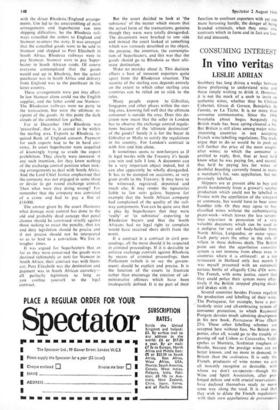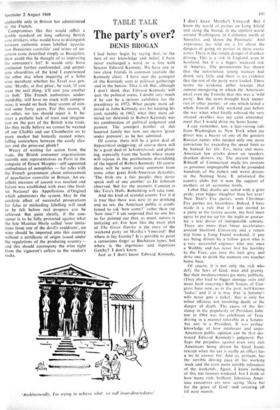CONSUMING INTEREST
In vino veritas
LESLIE ADRIAN
Snobbery has long driven a wedge betvs een those professing to understand wine and those simply wishing to drink it. However, it is not the mark of a snob to insist on authentic wines, whether they be Chilean Cabernet, Greco di Gerace, Beaujolais de ?armee, or La Tache. It is no more than consumer commonsense. Since the 1966 brouhaha about bogus burgundy the British trade has been spring-cleaned a bit. But Britain is still alone among major wine- importing countries in not accepting French wine-labelling regulations. The trade argue that to do so would be to push up still further the price of the most sought- after wines; to which the consumer is entitled to reply, first, that at least he'd know what he was paying for, and second, that he'd be paying less for wines of doubtful breeding currently found in many a merchant's list, sans appellation, but im- pressively labelled.
Shippers are at present able to buy and profit handsomely from a grower's surplus production which could not be labelled in France with the appellation of the vineyard or commune, but would have to bear some humbler title. Or they may agree to buy classified wines without the authenticating paper-work—which leaves the less scrupu- lous negotiant in possession of a very valuable document which can be used as a pedigree for any old body-builder from North Africa, Languedoc, or outer space. Each party casts the other in the role of villain in these dubious deals. The British point out that the appellation controlee system is not immune from abuse even in countries where it is enforced: at a top restaurant in Holland only last month I was myself presented with an extremely curious bottle of allegedly Cote d'Or wine. The French, with some justice, retort that they could police their system more effec- tively if the British stopped playing ducks and drakes with it.
Several countries besides France regulate the production and labelling of their wine. The Portuguese, for example, have a par- ticularly strict and all-embracing system of consumer protection, to which Raymond Postgate devotes much admiring description in his new book, Portuguese Wine (Dent 25s). These other labelling schemes are accepted here without fuss. No British im- porter, after all, would go to the trouble of passing off red Lisbon as Carcavelos, Vald- epetias as Murrieta, Sardinian roughers as Barolo, because the prestige wines are no better known, and no more in demand, in Britain than the ordinaires. It is only the French, producers of wine names we can all instantly recognise as desirable, with whom we. don't co-operate—though the Wine and Spirit Association, after pro- longed debate and with crucial reservations, have declared themselves ready to move some way along the road. It is said that they wish to dilute the French regulations with their own appellations de provenance.
applicable only in Britain but administered by the French.
Compromises like this would inflict a double standard on long suffering British wine drinkers, who would have to distinguish between authentic wines labelled 'appella- tion Beaujolais controlee' and wines of un- certain caste described simply as Beaujolais. How could this be thought of as improving the consumer's lot? It would only leave confusion further confounded, and perpet- uate absurdities of the kind I experienced the other day when inquiring of a Soho wine merchant whether his Tavel was gen- uine. 'Hardly, at that price', he said; 'if you want the real thing, it'll cost you another six bob.' The French authorities, under- standably, will have no truck with compro- mise; it would set back their system of con- trol some forty years. For this reason, if no other, we too should reject it. It be- trays a pathetic lack of trust and imagina- tion on the part of the British wine trade. Do they really believe we cannot be weaned off our Chablis and our Chambertin on to more modest but honestly named wines, falling somewhere between the costly clas- sics and the price-cut plonk?
Weary of waiting for action from the trade, the British consumer organisations recently sent representatives to Paris in the company of Ernest Marples—self-appointed ombudsman of oenophiles — for talks with the French government about enforcement of appellation control& in Britain. An ex- cellent measure of accord was reached and liaison was established with INAO (the Insti- tut National des Appellations d'Origine) which administers the system. May be the catalytic effect of successful prosecutions for false or misleading labelling will need to be felt before real progress can be achieved. But quite clearly, if the con- sumer is to be fully protected against what the late Maurice Healy called 'sour imita- tions from one of the devil's cauldrons', no wine should be imported into this country without a certificate of origin issued under the regulations of the producing country— and this should accompany the wine right from the vigneron's cellars to the vendor's racks.



































 Previous page
Previous page